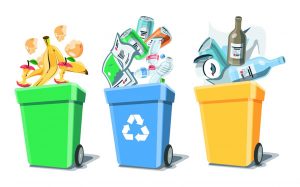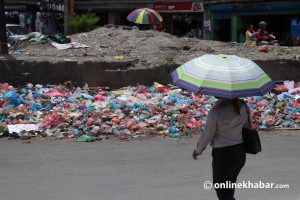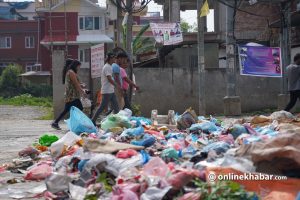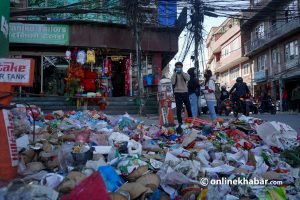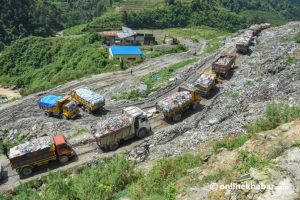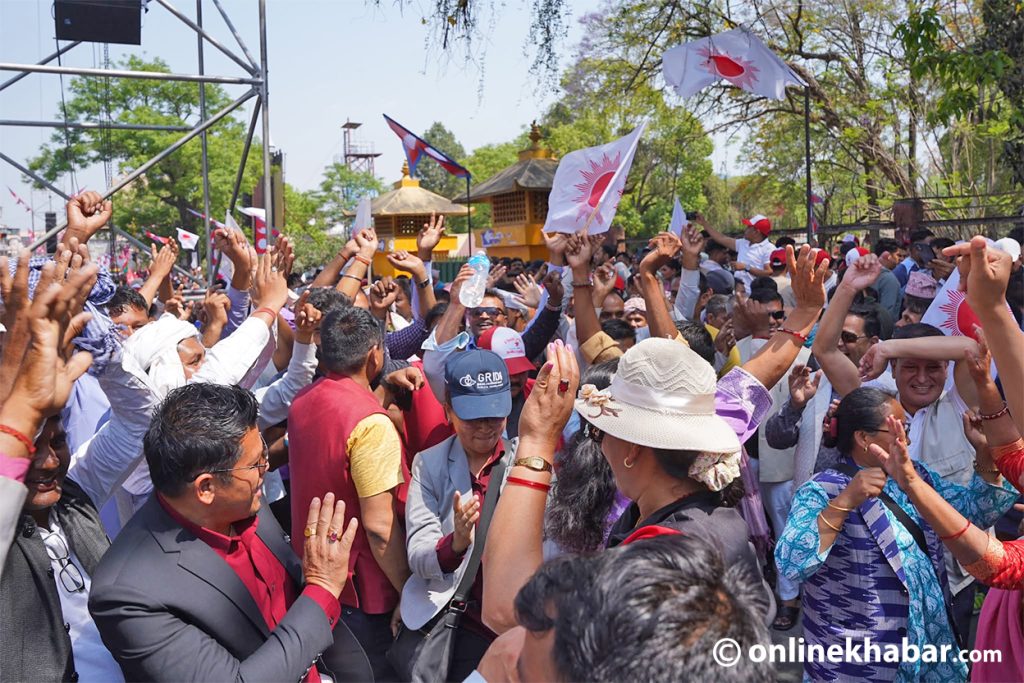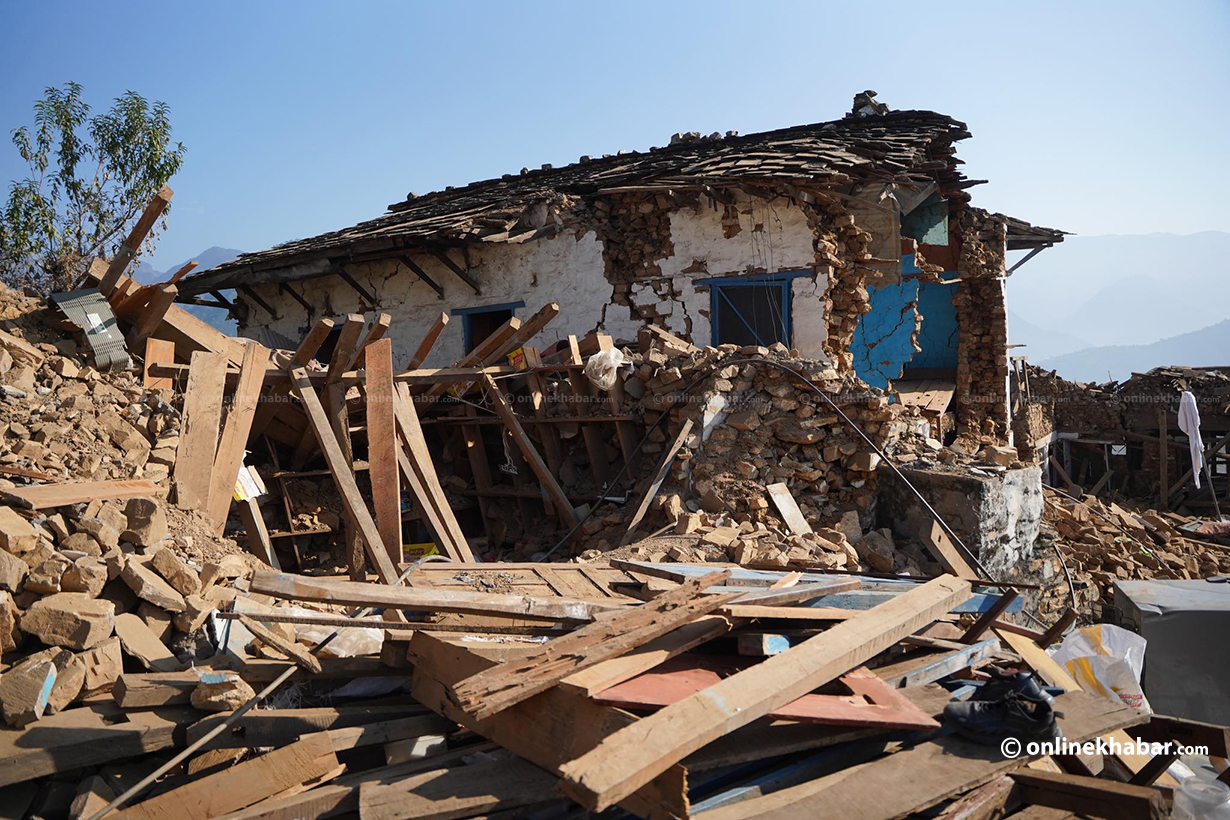The Kathmandu metropolitan city has recently announced that it will start penalising the households Rs 500 that do not segregate their waste, starting from July 17. The decision is one of the initiatives of the newly elected Kathmandu Mayor Balen Shah who has been actively speaking about solving the waste management problem of the city. However, researchers have opined that the new announcement to penalise the households is deemed to fail.
Mani Nepal and AK Enamul Haque who had conducted research in Bharatpur of Nepal and Sylhet of Bangladesh agree with the city government’s new approach to the waste management problem but suggest that for waste segregation to work at the individual level, penalising them will not be effective and will only turn out to be a burden to the city. They, instead, suggest focusing on incentivising good examples can work wonders.
Why the disbelief?

Principal Investigator Mani Nepal says, “How will the penalising system work anyways? The details are still unknown. The plan is great, but the lack of details and knowledge among the individuals regarding the whole process will further create hindrances, as it is not backed by research. It can nullify the city’s efforts at any given point.”
Meanwhile, he says, if people see that even if one person is not doing it or the penalising fails even once, it may discourage others too. Waste pickers collecting and mixing everything in one truck also will work against the cause. So it holds more chances of failure.
Researcher and resource economist Haque also comments, “Penalisation against waste segregation will not work because that demands constant monitoring. The plan will only increase the cost of the authorities, so it is neither a profitable nor a sustainable deal. Also penalising will not work because it will be driven by a top-down approach where there is an authority trying to control or impose something.”
“Instead, encouraging them works far better.”
If KMC insists on a monitoring approach, technological intervention is another way we can reduce the cost and maximise the output. But, Nepal suggests. it should be to make people accountable and not penalise them. “Cleanup Nepal has made an open-source waste map, where anyone can upload photos and videos whenever there is an irregularity in the community level.”
Haque seconds and adds, ”Crowdsourcing the work will work best while reporting littering. But, I would call it a means of citizen reporting to make the community responsible rather than ways to penalise the people.”
However, here, instead of penalising, the city government can also adopt a system like in the USA where the waste from their home will not be collected if they do not practise waste segregation properly.
Based on their research outcomes, both argue that if those who segregate are incentivised, it will have an environment that promotes and encourages the importance of waste segregation. And, they say the incentives should focus on household levels and on women.
Waste segregation approaches
The duo, as members of the South Asian Network for Development and Environmental Economics (SANDEE), share that the problem of waste management in Kathmandu will continue depending on the flow of the system itself. “The city is following or is in favour of the approach to collect, segregate and then dump the waste in the landfills. But, the right approach should be waste segregation, collection and then only dumping of the waste.
The researchers stress the Kathmandu city government can and should adopt the same approach as concluded by a recent paper. Yet, before Kathmandu adopts that model for waste segregation, Haque recommends a pilot project in one or two wards first, focusing on intervention with knowledge sharing at household and school levels.

“The problem of waste management is not unique to Kathmandu only. But, incentivising waste segregation can solve problems not just at the household level but also on the streets and community level,” Haque says, “Dhaka also suffered from the problem of waste management and littering by people. For that, they put dustbins every 100 metres, yet the streets were still polluted. This means that just adding dustbins will not change the root of the problem, which is human behaviour.”
Haque says the authorities should focus on more than the supply side. “Cities in Bangladesh were known to expand the capacity of the drainage system every two to three years to cater to the increasing need for the outlet’s capacity. But, expanding the outlet, though an option, is not a sustainable option. Increasing investment to better the water supply system and adding infrastructures are the same. Investment should be to correct human behaviour.”
Haque adds, “During our research, we found that the majority of the waste being dumped contained organic waste (which was the kitchen waste). And that when mixed with other recyclable materials made the latter useless. Hence, we saw the need for change in human behaviour and extreme invention at households levels.”
In the research, women in urban households in Bangladesh were seen to be at the centre of the waste segregation and waste management system. Given that Nepal also shares the same characteristics, he says, “The municipality is collecting the waste from a secondary system, and not from households. This is why the system is not effective at its core. All the waste is thrown away in the same (plastic) bags, without any segregation. So the paper concluded that women should be in the key while authorities encourage and incentivise waste segregation in their kitchen.”
Also, the researchers stress the waste should be thrown only after the waste pickers arrive and not before that. “If there is a gap between the waste being dumped from households and it being picked up by waste pickers, either because of animals or informal waste pickers poking through the waste for recyclable materials, the waste gets dispersed and any remnants of waste or plastics reach the drain and clog the drainage system, creating another problem,” Haque adds.
As per the research, when the gap was not minimised, streets continued to be littered and the drains clogged again in the next five years or so.
Connecting waste to money

Both Nepal and Haque also say the Kathmandu metropolitan city will heavily benefit from that small difference in approaches. “The research also found that if the waste was to be picked up on time, residents were willing to pay 10 to 28 per cent extra for the services creating additional Rs 5 to 6.5 million revenue that could be used for waste management.”
Additionally, Nepal shares, “Waste segregation decreases the need for waste management and the load on landfills as well as decreases the cost of waste transportation by some 80 per cent. So, the city’s key burdens will lessen that way too.”
Furthermore, they say, Nepal and Bangladesh have some similarities in their recycling efforts already in place. Nepal says, “Some 50 per cent of households of the research area were segregating and selling them for extra money. So when others knew that there was incentive and saw that there was a market, they started doing it as well and that changed the behaviour of people.”
It has more cascading advantages, including better return on investments in real estate prices. “As per the data of the housing prices all over Nepal, when two similar settlements were compared, the one that had a proper waste management system ended up having better real estate value. Meanwhile, having an open drainage system dropped the real estate value by 11 per cent,” informs Nepal.
Haque suggests, for now, that the Kathmandu metropolitan city should segregate waste into compostable and non-compostable. If waste segregation is done right, the non-compostable will give rise to the recycling market not just in Nepal but also in Bangladesh, where there is a bigger market for recyclable materials. The market can vary from recycling to using plastics in road construction or turning waste into energy.
Waste segregation for flood-free Kathmandu

Kathmandu’s other problem is the frequently clogged drainage system, especially during the monsoon, where due to the lack of proper outlets results in an overflow and inundation of the streets. But, the researchers say waste segregation can decrease this as well.
Nepal informs, “We surveyed 58 municipalities of Nepal and considered the aspects of plastic waste recycling. Not all plastics are recyclable, but a certain percentage can be recycled and people can get incentives from that. The revenue can be used further for any other (waste) management solutions.”
“Expanding the infrastructures and drainage capacity will work for a few years in the end, but without proper engineering and waste management solutions, the drainage will be clogged and we will get back to square one,” he adds.
According to Nepal, in Sylhet, they saw that the risk was brought down to three per cent from 22 per cent thanks to proper waste segregation. However, without regular waste management, the risk went back up to 18 per cent in just five years. In Bharatpur, the risk was brought down to three to four per cent, but without regular waste segregation and management, it went back to eight per cent. And this is connected to the aforementioned ROI on housing prices, making the living in the area better and more investment-friendly.
Lastly, he states, “The testament to human behaviour is the Bagmati cleanup campaign, which has been running for quite some time now. But, in the wintertime, the river has the same amount of waste. We are just picking it up, but not making any changes. If we just stop throwing waste in the streets and our water resources, the small step can make a big impact.”







